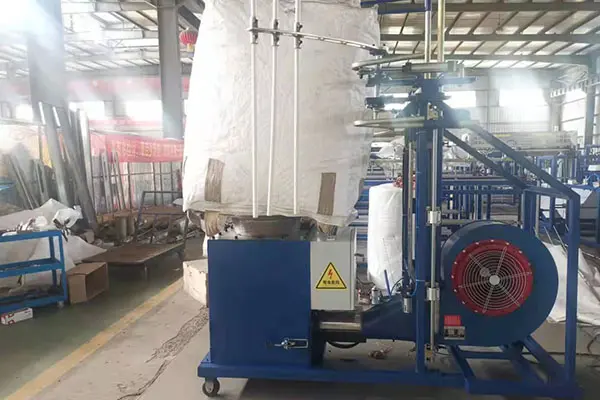Choosing the right FIBC (Flexible Intermediate Bulk Container) Bag Cleaning Machine is essential for maintaining quality and efficiency in your manufacturing processes. These machines are designed to eliminate waste caused by residual threads, foreign particles, and dust, ensuring that your FIBCs are clean and ready for reuse. Equipped with advanced features, these machines enhance operational efficiency and quality control.
Key Features of FIBC Bag Cleaning Machines
Modern FIBC Bag Cleaning Machines come with a variety of features that streamline the cleaning process. For instance, many models include dual cameras and LED lighting for thorough internal inspections, allowing for targeted cleaning of contaminants. The operation is typically managed by a microprocessor, enabling automatic adjustments based on the machine’s performance and the type of cleaning required.
A notable design element is the static discharge system, which helps ensure safe processing by preventing static buildup during cleaning. This is particularly important in industries handling flammable materials.
Choosing the Right FIBC for Your Needs
When selecting FIBCs, it’s vital to match the bags to your specific requirements. Different types of FIBCs are tailored for various applications, including agriculture, pharmaceuticals, chemicals, and food products. Understanding the characteristics of each bag type will help you select the most suitable option for your operation.
Size Considerations
The size of the FIBC is a critical factor. It’s essential to choose bags that accommodate your product’s weight and dimensions, as well as the handling methods you plan to use. For example, if you’re using pallets for storage, select bags that fit comfortably on the pallets without overhang.
For heavy products, make sure the FIBCs can withstand significant weight to prevent tears or breakage. Correct sizing will minimize product waste, enhance profitability, and reduce the risk of workplace injuries.
To find the ideal size for your bulk bags, consider two key factors: the density of your product (measured in pounds per cubic foot) and the dimensions of your pallets. Collaborating with a professional supplier can help you determine the necessary specifications for your bags to ensure they fit securely on your pallets, optimizing storage space.
Types of FIBC Bags
FIBCs are categorized by a standard system that uses letters to indicate their physical properties and safety features. This classification is crucial for minimizing risks like fires and electric shocks, and ensuring employee safety in the workplace.
Type A: The most common FIBC, made from woven polypropylene, these bags are not suitable for storing combustible materials.
Type B: Similar to Type A, but with an additional coating for spark protection.
Type C: These bags incorporate carbon filaments to protect against flammable powders but require grounding during use for safety.
Type D: Containing antistatic materials, these bags are safe for flammable powders and do not need grounding.
Choosing the right material type is especially important in chemical manufacturing and other industries handling hazardous materials.
FIBC Construction Styles
Different construction styles offer unique benefits:
- Duffle Top Bags: These feature a closable fabric top for secure filling, reducing product loss during transport.
- Spout Top Bags: Rigid spouts provide stability during filling, minimizing mess and maximizing efficiency.
- Open Top Bags: Ideal for manual loading, these bags allow for airflow, making them suitable for perishable items.
- Baffled Bags: With stiff panels, these bags maintain a square shape, maximizing storage efficiency and stability when stacked.
Ensuring Quality
Quality assurance is paramount for FIBCs used in sensitive industries like food processing and pharmaceuticals. Bags are subjected to rigorous inspections to check for defects and ensure they meet cleanliness standards. Discharge spouts are secured, and bags are often compressed into bales to save on shipping costs and storage space.
With this comprehensive guide, you can confidently choose the right FIBC Bag Cleaning Machine and the appropriate bulk bags for your business. Whether you’re in manufacturing, agriculture, or food processing, selecting the right equipment and materials will enhance your operational efficiency and product quality.
Post time: 9月-26-2024


